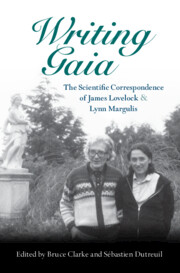Book contents
- Writing Gaia: The Scientific Correspondence of James Lovelock and Lynn Margulis
- Reviews
- Writing Gaia: The Scientific Correspondence of James Lovelock and Lynn Margulis
- Copyright page
- Epigraph
- Table of Contents
- Figures
- Contributors
- Foreword by James Lovelock
- Preface
- Acknowledgements
- Introduction
- Part I 1970–1972
- Part II 1973–1979
- Part III 1980–1991
- Part IV 1992–2007
- 1992
- 1993
- 1994
- 1995
- 1996
- 1997
- 1998
- 1999
- 2000
- 2001
- 2002
- 2003
- 2004
- 2006
- 2007
- Part V Commentaries on Lovelock and Margulis
- Glossary of Names
- Glossary of Terms
- Bibliography
- Index
1995
from Part IV - 1992–2007
Published online by Cambridge University Press: 28 July 2022
- Writing Gaia: The Scientific Correspondence of James Lovelock and Lynn Margulis
- Reviews
- Writing Gaia: The Scientific Correspondence of James Lovelock and Lynn Margulis
- Copyright page
- Epigraph
- Table of Contents
- Figures
- Contributors
- Foreword by James Lovelock
- Preface
- Acknowledgements
- Introduction
- Part I 1970–1972
- Part II 1973–1979
- Part III 1980–1991
- Part IV 1992–2007
- 1992
- 1993
- 1994
- 1995
- 1996
- 1997
- 1998
- 1999
- 2000
- 2001
- 2002
- 2003
- 2004
- 2006
- 2007
- Part V Commentaries on Lovelock and Margulis
- Glossary of Names
- Glossary of Terms
- Bibliography
- Index
Summary
By the mid 1990s, convinced that the Gaia concept was making inroads with the scientific establishment in England, including the bastion of British neo-Darwinist opposition, Lovelock was increasingly sanguine about Gaia’s prospects for full scientific recognition. Writing to Margulis in May 1995, he described his encounter with a formidable evolutionary theorist, famous for his work on kin selection (the “gene-eyed view” of altruism): I had a meeting with W. D. Hamilton last week – one of the fringe benefits of the Oxford connection. Although he was a kindly and thoughtful man, the meeting was what might have been expected between a geophysiologist and a neodarwinist; we agreed to disagree. Two days later I had a letter from him. In it he said that after much thought it seemed to him that Gaia was after all not inconsistent with Darwin. Where organisms affected their personal environment then the tendency could be inherited and could become extensive, even global. Things move, we have won over Maynard Smith and now perhaps Oxford’s leading neodarwinist also.
- Type
- Chapter
- Information
- Publisher: Cambridge University PressPrint publication year: 2022

